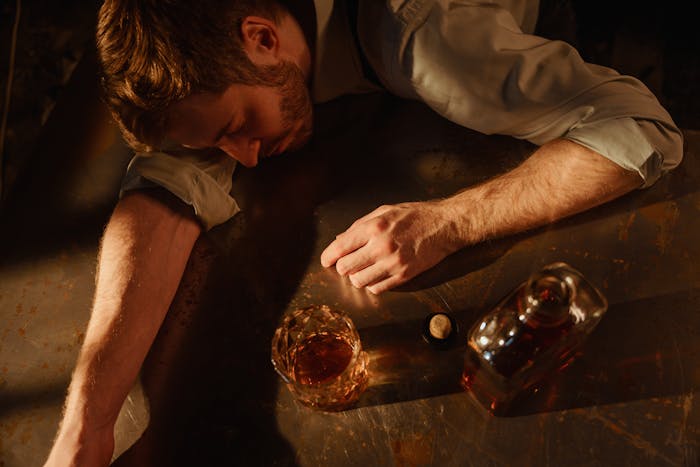Alcohol poisoning is a serious and potentially life-threatening condition that happens when someone drinks more alcohol than their body can safely process.
It can have a number of different effects on your body, including heart rate, breathing, body temperature, and your general consciousness.
In severe cases, it can even be fatal. [1]
Recovery time from alcohol poisoning varies, depending on multiple factors such as how much alcohol was consumed or the person’s body weight.
This blog will explain more about what alcohol poisoning is, how long it lasts, and what to do if you think you or someone you know is suffering from it.

Alcohol poisoning occurs when excess alcohol in your bloodstream starts to impact life-supporting functions like breathing and heart rate. Eventually, it can lead to vital functions shutting down.
The liver can typically process around one drink of alcohol per hour, but this varies from person to person.
If someone drinks a large amount of alcohol over a short period of time, excess alcohol builds up in the bloodstream faster than the body can remove it.
Symptoms of alcohol poisoning include:
If someone is exhibiting these signs, it is essential to call the emergency services immediately at 999 in the UK. Alcohol poisoning requires urgent medical attention.

There is no fixed timeline for recovery from alcohol poisoning, since it depends on the severity of the situation. However, below is a general guide from a case requiring medical attention:
This is when there is excess alcohol in the bloodstream, and levels are at their highest.
During this time, the person may find that they lose consciousness, have slow or irregular breathing, or experience vomiting.
Immediate hospital treatment is needed, including intravenous fluids, oxygen therapy, and regular monitoring.
After medical treatment begins, alcohol levels will start to drop as the liver works to metabolise the alcohol.
Any symptoms that the person was experiencing, such as confusion, vomiting or seizures, should gradually reduce.
However, the person may still feel fatigued and suffer from dehydration or headaches.
After leaving the hospital, many people still find they have lingering symptoms, including:
These symptoms can last for a few days as the body and brain gradually recover from the excess alcohol and its toxic effects.

Several factors influence the recovery time from alcohol poisoning, such as:
Many people can recover fully from alcohol poisoning, especially if it is mild poisoning.
However, alcohol poisoning can sometimes lead to long-term effects and lasting damage, particularly if the brain has been deprived of oxygen for any amount of time or if organs like the liver or kidneys have been affected. [2]
If you suffer from repeated episodes of binge drinking or alcohol poisoning, this can increase your risk of:
If you are suffering from frequent blackouts, vomiting or severe hangovers after drinking, this could be a sign that you have a harmful drinking habit that needs further attention.

If you think you or someone you are around is suffering from alcohol poisoning, you should seek medical attention and not just try to “sleep it off”.
Take the following steps: [3]

If you have experienced alcohol poisoning, you may be struggling with dangerous drinking habits. If you find yourself binge drinking, having regular blackouts or relying on alcohol to cope with stress or anxiety, you may need professional support.
Recovery is possible and, with the right support, you can live a fulfilling life without needing to turn to alcohol.
At Rehab 4 Addiction, we support individuals to access safe and effective treatment programmes that are tailored entirely to their specific needs.
The treatment process typically involves several steps to ensure both your physical and psychological needs are addressed.
The first step is usually a medically supervised detox to remove alcohol from the body.
This stage usually takes between 7 and 10 days, depending on how severe the alcohol dependence is.
During the entirety of the detox, you will be safely monitored by healthcare professionals who will support you by providing medication to help with any withdrawal symptoms you may experience.
Once the detox is complete, it is important to look at the root causes to help you understand more about your previous drinking habits. This ensures that your recovery is sustainable and long-term.
Therapy usually includes:
It is important to continue your recovery journey when you leave rehab, which is why aftercare and relapse prevention are fully built into your rehab programme.
Many people leaving rehab continue to attend therapy sessions, support groups, or utilise relapse prevention techniques once you have completed your initial treatment.
Aftercare following rehab treatment involves developing coping mechanisms, learning how to manage stress and cravings, and maintaining supportive networks.
It can be challenging to take the first step towards recovery, but recognising that you have a problem takes the most strength.
Our Rehab 4 Addiction team can guide you through your options and help you access the help you feel you need, whether that’s an immediate detox at home, residential rehab or outpatient, community-based support.
Call us today at 0800 140 3690 for confidential advice that can help you start the journey to recovery.
[1] https://www.niaaa.nih.gov/sites/default/files/publications/overdoseFact.pdf
[3] https://www.sja.org.uk/first-aid-advice/alcohol-poisoning/